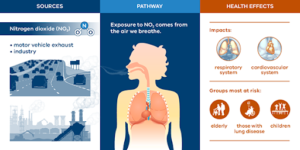
Overview
- Nitrogen Dioxide (NO₂) is a significant air pollutant and a notable constituent of urban smog.
- It plays a critical role in atmospheric reactions that produce ground-level ozone or smog.
Primary Sources of Nitrogen Dioxide
- Fossil Fuel Combustion: Majorly produced by vehicles and industrial processes.
- Power Plants: Burning of coal or gas in power plants.
- Domestic Heating and Cooking: Utilizing oil, gas, coal, or wood.
- Agricultural Activities: Certain chemical reactions involving fertilizers and manures release NO₂.
Environmental and Health Impact
- Respiratory Issues: Aggravates respiratory diseases, particularly asthma, leading to respiratory symptoms (such as coughing, wheezing, or difficulty in breathing), hospital admissions, and visits to emergency rooms.
- Environmental Damage: Leads to acid rain and eutrophication in water bodies, negatively affecting wildlife and habitats.
- Formation of Smog and Acid Rain: NO₂ reacts with water, oxygen, and other chemicals in the atmosphere to form acid rain. It also contributes to the formation of smog.
- Visibility Reduction: Contributes to haze and reduced visibility in urban and natural areas.
Why in News:
- A recent study by AIIMS has linked the rise of nitrogen dioxide leading to rise in patients with respiratory issues.
 Profile
Profile Settings
Settings Refer your friends
Refer your friends Sign out
Sign out




